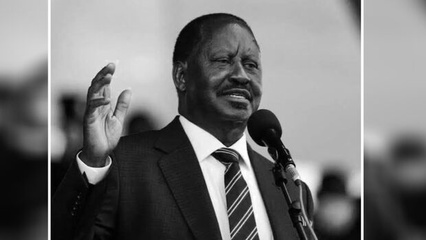Raila Odinga, a veteran Kenyan opposition leader who served as prime minister and made five unsuccessful bids for the presidency, has died, according to multiple Kenyan media reports. He was 80.
The Nairobi-based Star newspaper and other outlets reported that Odinga died Wednesday morning in India after suffering a heart attack. The reports cited sources within his family.
Odinga was a dominant figure in Kenyan politics for more than three decades. His presidential campaigns were consistently marred by allegations of vote-rigging, claims that repeatedly triggered ethnic violence.
The son of Jaramogi Oginga Odinga, Kenya’s first vice president, he was considered political royalty in the East African nation. He commanded a massive following, and his calls to protest perceived election fraud often brought supporters into the streets.
The most severe crisis followed the 2007 election, when more than 1,100 people died. A U.N.-backed truce, mediated by then-South African leader Thabo Mbeki, led to the formation of a coalition government with Odinga serving as prime minister under President Mwai Kibaki.
Odinga narrowly lost his fifth presidential bid to William Ruto in 2022. While the Supreme Court upheld the result, Odinga rejected it and held protests over the outcome and rising living costs. Dozens died in the ensuing unrest. The two rivals later reconciled, and members of Odinga’s party joined the government.
Born Jan. 7, 1945, in Maseno, Odinga studied engineering in Germany and lectured at the University of Nairobi before entering politics.
His political career was forged in resistance. He was arrested in 1982 for his alleged role in a failed coup against President Daniel Arap Moi and was imprisoned for six years without trial. He was detained several times after his release, with his final incarceration ending in 1991 as Kenya transitioned to a multi-party system.
Odinga was first elected to parliament in 1992. He made his initial presidential run in 1997. After serving as energy minister in a coalition, he played a pivotal role in the 2002 alliance that ended decades of rule by the Kenya African National Union party.
Appointed minister of roads, he later fell out with Kibaki, accusing him of reneging on a power-sharing deal.
His 2007 presidential run against Kibaki ended in a disputed outcome and the subsequent violence that led to his term as prime minister. He later lost presidential votes to Uhuru Kenyatta in 2013 and 2017. The Supreme Court annulled the 2017 result, but Odinga boycotted the fresh election.
In a notable political shift, Kenyatta later backed Odinga’s 2022 campaign. Most recently, in February 2025, Odinga lost an election to become the chair of the African Union Commission.
Odinga is survived by his wife, Ida, whom he married in 1973, and their four children.




